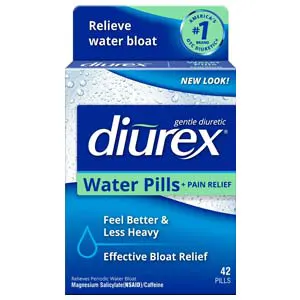Diuretics - Get The Facts & Truth About Water Pills
Are water pills a safe option for reducing bloat? Is it actually safe? Find out here!
Diuretics aka water pills, can help rid your body of salt (sodium) and water. Shutterstock Images
What are Water Pills?
Water pills, medically known as diuretics, are the first line medications prescribed to individuals with high blood pressure. It works by inducing urination, thus ridding the kidneys of excess water and the entire body of excess sodium. By reducing the amount of fluid in the blood vessels, the pressure inside them goes down in turn making it easier for the heart to pump blood.
Highly Recommended
![Our Recommended Product Diurex Our Recommended Product Diurex]()
Best Water Retention Product
Diurex is an anti-bloating medicine comprises of six formulations including Diurex Aquagels, Diurex Ultra, Diurex Water Pills, Diurex MAX Water Caplets, Diurex Water Capsules, and Diurex WaterCaps.
You can BUY it directly from the amazon.com
Latest Water Retention Products
Reasons for Taking Water Pills
In general, water pills in both medication and supplements form are used in conditions that have something to do with excess fluid retention. Prescription water pills are used mainly to manage high blood pressure, or they may also be used to treat other associated conditions such as congestive heart failure and the edema that comes with it. As for water pills, they are used for other purposes such as relieving bloatedness and reducing water weight.
Types of Prescription Water Pills
There are three types of prescription water pills and they all work the same way - inducing your body to get rid of excess fluids through urination.
- Thiazide Diuretics - The most popular type and also the most commonly prescribed. They work not only by expelling excess fluids, but also by causing the blood vessels to relax or dilate. They are often combined with other blood pressure medications. Examples of thiazide diuretics include chlorothiazide, hydrochlorothiazide, indapamide, and metolazone.
- Loop Diuretics - This type is primarily used in the treatment of high blood pressure and edema brought about by congestive heart failure, liver failure, and chronic kidney disease. They work by reducing the amounts of calcium, potassium, and chloride reabsorbed by the kidneys. As these ions are expelled, water follows them, resulting in increased urine volume. Furosemide is a commonly prescribed loop diuretic.
- Potassium-Sparing Diuretics - As the name suggests, this type of water pill decreases fluid levels in the body without losing potassium ions. They are prescribed for individuals who already have low potassium levels. Their main disadvantage is that they are not as effective as thiazide or loop diuretics. To increase their effect, doctors often combine them with other blood pressure medications. Among the most popular potassium-sparing diuretics are amiloride, spironolactone, and triamterene.
What are the Key Ingredients to Look for in Natural Water Pills?
As for over-the-counter natural water pills, the following herbs and plant-based ingredients are deemed helpful:
Dandelion - A gentle diuretic that safely reduces excess fluids and provides relief from swelling. Its other important benefit is promoting liver detoxification (source).
Green Tea - This popular beverage contains caffeine, which is a powerful diuretic. Regular consumption is said to aid in loss of water weight (source).
Hawthorn - A relative of the rose family, this plant has an effective diuretic effect that helps reduce fluid buildup. It is used for treating kidney problems and cardiovascular diseases, where it is found to be effective in relieving the symptoms of heart failure (source).
Hibiscus - A natural diuretic that also helps protect against loss of sodium and potassium ions (source).
Parsley - Exerts a diuretic effect by acting on the Na/K pump, thereby inhibiting the reabsorption of sodium and potassium. It also has the added benefit of relieving gastrointestinal discomforts.
Water Pills - Do They Really Work?
Prescription water pills are helpful in treating high blood pressure and other associated conditions. As for herbal or plant-based water pills, they can be a good option for individuals who prefer a natural alternative. Just look for ones with the right ingredients or better yet, consult your trusted healthcare specialist for valuable suggestions.
What are the Side Effects of Water Pills?
The main side effect water pills is frequent urination, since your body is getting rid of excess water. This occurs up to several hours after intake. Side effects associated with frequent urination include dehydration, dry mouth, and dizziness or lightheadedness to name a few. Older people tend to experience more of these side effects.
Meanwhile, too little sodium and potassium can lead to tiredness or weakness, muscle cramps, headaches, and palpitations. And if your potassium levels fall dangerously low, you may start throwing up. In case of such, contact your healthcare specialist immediately.
Prescription water pills must be used with caution by pregnant or breastfeeding women, as we're not certain how these medications can affect an unborn baby. Also most of them are passed through breastmilk and may cause dehydration in young kids. As for natural water pills, it might be best to avoid them unless you healthcare specialist approves their use.
How to Choose the Best Water Pills?
Since water pills are unlike your ordinary dietary supplements, they must be obtained only upon prescription or recommendation of your trusted healthcare specialist. He or she will determine which type will work best for you depending on the cause.
The Bottom Line
Water pills, in general, are effective in reducing too much fluid buildup in the body. Both forms are beneficial when used exactly as instructed. Prescription water pills aren't much of a problem, as their use is guided by a medical professional.
Water supplements, on the other hand, aren't as regulated so it is advised to consult your health specialist first prior to using these products, especially if you are taking other medications or supplements. These natural alternatives are helpful as well, but you have to determine the right dosage for your as well as the potential drug interactions.
**This is a subjective assessment based on the strength of the available informations and our estimation of efficacy.
*Result may vary. The information contained in this website is provided for general informational purpose. No medical claims are implied in this content, and the information herein is not intended to be used for self diagnosis or self treatment of any condition.
*Disclosure of Material connection: Some of the links in the post above are "associate sales links." This means if you can click on the link and purchase an item, we will receive a commission. Regardless, we only recommend products or services which we use personally and/or believe will add value to our readers. We are disclosing this in accordance with the Federal Trade Commission's 16 CFR, Part 255: "Guides Concerning the Use of Endorsements and Testimonials."





